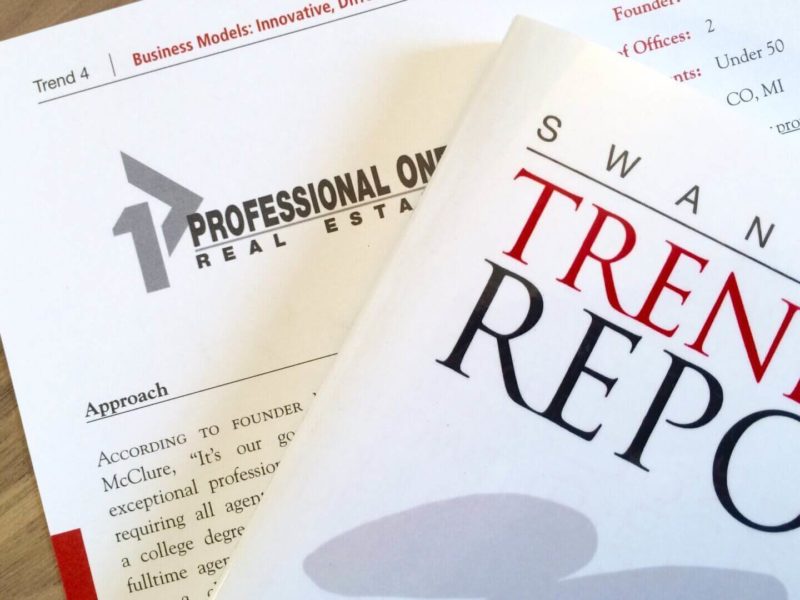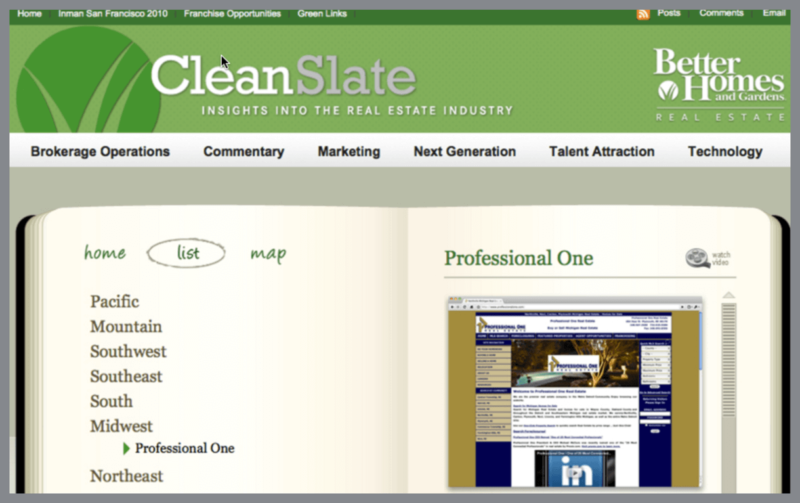The Brand Illusion | Part 2
The issue of the “value of the brokerage/the brand” continues to rage across Social Media.
I wrote a post called “The Brand Illusion.”
Jay Thompson (@phxREguy) wrote a blog post called “Does the Real Estate Brokerage Matter to the Home Buyer/Seller?”
Marc Davison (@1000WattMarc) wrote a blog post called “Can a Real Estate Brokerage Matter?”
I love the passion I feel in so many of the comments that followed Jay’s and Marc’s excellent, provocative posts.
Truly, a LOT has been said about this issue.
And rightfully so, because I believe this issue is critical to the future direction of the industry.
If the brand/brokerage truly does not matter, then it isn’t too much of a leap to conclude that the continued erosion of the “big brands” is likely to continue.
I won’t waste the time to reiterate the highlights of the thread so far, but PLEASE read the earlier posts to absorb the debate to date.
I’m already on record that I don’t think the brand/brokerage matters that much, and I believe the “generally accepted stats” support this assertion. I worked at a local brokerage, and then at RE/MAX and Keller Williams, and my clients not only didn’t care where I worked, they often didn’t even KNOW where I worked.
As I wrote in my original post, the space in my clients’ brains assigned to me was nothing more than “Real Estate = Michael at 248-789-4200.” The default “data fields” are simply “name of agent” and “phone number.”
Period. End of story.
I truly believe that to be the case for most real estate buyers and sellers.
The purpose of this post is to point out my subjective thoughts on WHY the brokerage/brand does not matter much.
I’ll call these “the practical, logical, common sense reasons why the brokerage/brand does not matter much to the typical real estate client.”
Here are the more significant of those reasons:
- Because of the dynamics of the “broker/independent contractor” relationship:
- As a broker/owner, I have learned what this means at the street level. And what this means is that my power over my agents is fairly limited. I can and have articulated a clear vision for our brand, but, at the end of the day, they are legally independent of me. That means a broker cannot even force agents to attend meetings.
- So, at the end of the day, all we can really do is “suggest and hope.” This creates a huge “gap” in the “executability and consistency” of a brand’s mission statement (for those companies that even have mission statements).
- When I worked at RE/MAX, which I did for seven years, the agent in the office next to me was a mega-producer. I watched him “do his thing” day in and day out. There was absolutely NOTHING we had in common in how we serviced our clients. NOTHING. His entire focus was “dollars.” My entire focus was “clients.” But we both flew the “Above the Crowd” logo. That was our only common denominator. If you asked his clients to define what it meant to work with a RE/MAX agent, I GUARANTEE YOU they’d give a different answer from what my clients would have said in response to that same query.
- The end result: Across the “sweet spot” of the industry, for the most part, agents do their own thing. This is why there is so little uniformity in how services are provided in real estate. And with a lack of uniformity, the value of the brokerage and the brand are diluted and diminished.
- Because of the lack of broker visibility to agent conduct:
- Brokers have almost no clue what their agents are doing out in the field. Because of the hyper-transient nature of real estate, easily 95% of the job is done outside the walls of the brokerage.
- Coupled with the prior point, this make it nearly impossible for the typical broker to monitor whether an agent is or is not doing the job to the standards of the company.
- The end result: It’s hard for brokers to correct bad behavior, because they don’t know about it until it’s too late.
- Again, the value of the brokerage and the brand are diluted and diminished when agent behavior does not line up with the core values of the company.
- Because of the nature of how the service is provided:
- Even when agents perform their job perfectly, it is the AGENT that is delivering the service, not the brokerage or the brand.
- The only real exception I can think of to the prior bullet is the relationship that is created over time between listing client and the brokerage’s front desk/receptionist function. THERE – of all places – is where the listing client DOES create a relationship with the brokerage/the brand. That’s why the person who answers the phone in a brokerage is so critical.
- In 20 years of working in this industry, I have never had a client even SPEAK with – let alone MEET – any of my prior brokers. Not one time.
- Ergo, my clients’ knowledge of “the brand” began and ended with me, the agent, or, if it was a listing client, with me and whoever answered the phone at my brokerage. My actual broker was never a part of the “client service experience” for any of my clients.
- Because the typical client has little or no interaction with the brokerage itself:
- As already noted, 95% of the job of selling real estate – for the vast majority of agents – is conducted outside the walls of a typical brokerage.
- When I worked with sellers, the only time they ever sat foot in my office was at the closing (and more often than not, the closings took place at a title company, so most sellers never saw the inside of my brokerage).
- When I worked with buyers, the only time they ever sat foot in my office was to sign an offer, and that usually only happened once. Since in Michigan the seller picks the title company, and the listing office or the title company hosts the closing, there was almost never a need for the buyer to visit the office again.
- As a broker/owner, I can say that clients rarely visit my office, because my agents conduct business about the same way I did.
- The end results: the typical client either never visits the brokerage, or they do so *maybe* once. Ergo, there’s little or no opportunity to attach value – good or bad – to the brokerage. (And this is why “brick & mortar” will one day cease to exist in real estate, but that’s a topic for another blog post on another day.)
- Because of the dynamics of the 10/90 “big box offices” that continue to dominate the industry:
- I worked at a big-box office for a short time. At its peak, that office had nearly 300 agents, of which less than 15% made enough money to cover their “cap.” Further, I would guess that 10% of those agents made 90% of the income.
- When you have a corporate culture built on this kind of philosophy, that means that 85-90% of the agents out in the world are NOT doing much business. And while I am NOT suggesting that there is any direct correlation between “sales volume” and “quality of service,” the hard reality is that it’s probably not realistic to expect that a uniform delivery of service when 85% of your agents are not doing enough business to support themselves financially.
- The point: in a “10/90″ environment, brand dilution is almost guaranteed. And there are a lot of “10/90″ brands out there today. For further support of this logic, check out Malcolm Gladwell’s “Rule of 150,” which was one of the key concepts of his book “The Tipping Point.”
- Because of the emergence of teams:
- Teams are all the rage these days. I could write a lot more on this point, but here’s the gist: the team just creates one more “barrier” between client and brokerage/brand.
- Now it becomes “Joe Smith, Realtor, member of The Bob Jones Team.” The brokerage/brand is mentioned in 6 point font at the bottom of the business card, and mentioned only because the law requires it.
- Once more, the brokerage takes a back seat, and the value attached to the brand is further diminished.
- Because so much information is obtained from sources other than the brokerage or the brand:
- The information explosion has changed so much about the real estate game. Clients now come 50 times more knowledgeable and prepared than they did even two or three years ago.
- And where do they get this information? From Realtor.com. And Zillow. And Trulia. And literally 100,000 other websites. Because our website ranks so well in our market, we ROUTINELY get calls from other agents’ clients inquiring about IDX-sourced listings they found on our site. And we frequently get showing requests from other agents’ clients on listings that are not ours, because the client found the listing on our site. And we frequently get web users on our site who list the names of our competitors in the data field that asks “Are you working with another agent?”
- The point: most agents and most brokerages have weak websites. So, people go looking for the information they want, and they find it on someone else’s website.
- Ergo, there is no brand/brokerage value assigned to the actual brokerage in question when other companies’ sites provide the information people are seeking.
- Because brokers/brands gave away the power a long time ago, and it’s nearly impossible to get it back:
- Exactly as the auto industry did with the UAW (I live in Metro Detroit, and I live with the results of this every day), when times were good, the brokerages gave away the power to the agents a long, long time ago.
- When the agents have the power, you have little hope of providing a consistent, uniform, homogeneous client service experience. That’s a very concise summation of a point that could support a novel.
- Because there is so little true differentiation in real estate:
- What’s the difference between the big brands in real estate? As I see it – and this is admittedly ENORMOUSLY subjective – not much. Why? Because:
- Most provide similar services at similar rates.
- Most use platitudes to sell themselves (“We’re number 1!“).
- I believe that the public stopped listening a very long time ago, and I think the Harris Polls support this assertion.
- Who is doing anything truly “unique” in real estate on a national scale? From where I sit, that begins and ends with Redfin. Others are emerging, but right now, on that level, Redfin is the only brand with any true differentiation from the pack.
- The point: most all of the big brands blend together in the collective mind of the public. In the end, Big Box Broker A = Big Box Broker B = Big Box Broker C. Ergo, the only differentiation possible is at the agent/team level. Don’t believe me? Watch this video (see original version of this video here):
- What’s the difference between the big brands in real estate? As I see it – and this is admittedly ENORMOUSLY subjective – not much. Why? Because:
- Because “big advertising” is being supplanted by “word of mouth/peer recommendations/Social Media:”
- Prior to the advent of Social Media, big brands had a massive advantage over their smaller competitors: they could afford big media promotion, while local/regional companies typically could not.
- And then a little thing called “Social Media” showed up. And that changed everything, as people now trust consumer recommendations more than traditional advertising.
- A few weeks ago, traffic on FaceBook exceeded traffic on Google. Yep, that’s kind of a big deal.
- The point: national, mega ad campaigns…which naturally favored the big brands…are being replaced by hyper-local, consumer-sourced recommendations…which naturally favor the agent.
- Because big brands are failing, and this tarnishes the overall value of branding in real estate:
- In my market, the single largest Century 21 franchisee in the world filed for bankruptcy last year, shuttering two huge offices in my backyard (one a few blocks from me, and the other five miles to the north, among others). One of the largest RE/MAX franchisees in Michigan shrunk from four locations to one. A large, multi-office Coldwell Banker franchise was acquired by a much smaller local player. A large Keller Williams office shrunk dramatically and moved into a much smaller office.
- I am not suggesting that there is ANYTHING wrong with ANY of these brands. In most cases, they were simply the victim of these horrific economic times, and the largest companies have logically been hit the hardest. And, because they are large and prominent, it’s much easier for the public to know about it.
- But whatever the reason, all the public knows is this: “There used to be a huge Century 21 office right here. And now it’s gone.” Or: “When did Coldwell Banker modify their name like that, and why?” Or: “That RE/MAX office is now a doctor’s office…I wonder what happened?”
- The point: as high-profile brands fail or retrench, the value attached to the big brands in the industry logically diminishes.
In summary, allow me to reiterate my original position: the brokerage/the brand does not matter to the typical to the typical real estate buyer or seller.
Could this change in the future? Absolutely.
And we believe it will…







